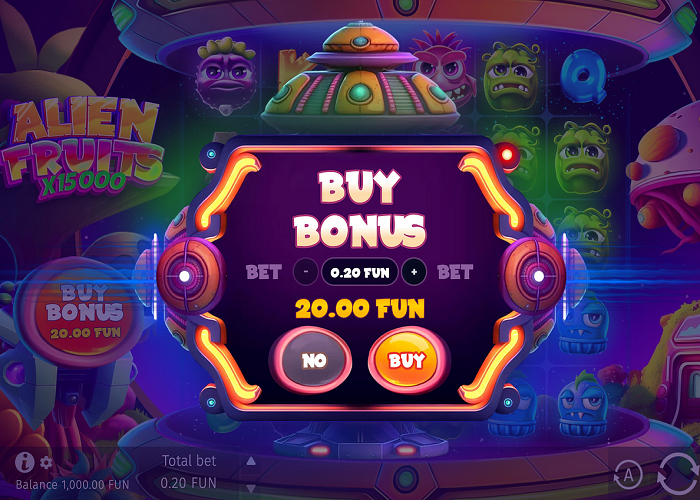
The allure of bonus buy slots is strong. Who wouldn’t want to pay a small fee to instantly trigger a potentially lucrative bonus round? But are these enticing features actually a smart play from a mathematical perspective? By analyzing the math behind bonus buys, we can unravel whether purchasing access to free spins and mini-games makes strategic sense.
Temptation of Instant Gratification
Bonus buy slots, like those at Locowin Casino, enable you to pay a designated amount, often 50x to 100x your bet size, to instantly reveal a site’s bonus feature. Rather than waiting to trigger free spins or a pick-me-round organically through gameplay, bonus buys let impatience take the wheel.
This instant gratification is a large part of bonus buys’ appeal. With a single click, you can access the most exciting parts of a slot without the usual grind. But fun and profit do not always align. So what does the math say about whether bonus buy slots offer an actual mathematical edge?
Factoring Volatility Into the Value of Bonus Buys
One key element that impacts the value of a bonus buy is the slot’s volatility. High variance slots produce more sizeable wins, but also longer dry spells between payouts. Low-variance games deliver smaller but more frequent wins.
During typical gameplay, volatility does not impact mathematical advantage. But with bonus buys, variance plays a major role. Here’s why:
- In high-volatility games, bonus buys can deliver massive wins that vastly outweigh their cost. However, their extreme volatility also means more frequent zero-payout bonuses.
- In low-variance games, wins from bonus buys rarely reach epic proportions. However, smaller wins are more consistent, reducing the likelihood of zero payouts.
So while high volatility slots offer the highest bonus buy upside, low variance games provide more reliable returns. This makes assessing true mathematical value tricky.
Calculating the Statistical Edge of Bonus Buys
To determine if a bonus buy slot offers a true mathematical edge, you need to compare its bonus buy cost to the feature’s average payout.
For example, if a slot’s free spins round has an average payout of 60x your bet, but the bonus buy costs 100x your wager, there is no statistical value to the upfront cost.
However, calculating reliable payout averages for bonus features is difficult. The limited number of rounds makes fluctuation a factor, and slots rarely publish this internal data. Players typically must rely on anecdotal evidence within online communities.
When Bonus Buys Make Mathematical Sense
While determining a precise mathematical edge is challenging, there are certain scenarios where bonus buys statistically make sense:
- In low variance slots where bonus buy costs barely exceed average bonus payouts. The smaller bets ensure more reliable returns that can outweigh the small upfront investment.
- In games with lucrative expanding symbols or persistent wilds within free spins. Even a few bonus rounds with these premium symbols can produce outsized wins.
- In slots where your bet size greatly impacts bonus value. Some games scale up available multipliers, instant cash prizes, or other rewards based on the size of your wager.
Pitfalls of Bonus Buy Psychology
Even in edge cases, the psychology of bonus buys introduces pitfalls. Having instant access to a slot’s most exciting features can encourage overplaying a mediocre or losing game. The instant rush keeps you hooked despite the mathematical disadvantage.
Bonus buys also cultivate a dangerous sense of “free spins.” In reality, purchasing access to bonus features costs a set amount. But players can perceive these as “free” rounds since no bet triggered them organically. This psychology can mask losses from paid bonus access.
Tying Math to Strategy With Bonus Buys
While determining a precise mathematical edge is difficult, analyzing average bonus payouts against bonus buy costs provides a framework for strategizing these features. Here are some best practices:
- Track bonus data – Manually record results from organic and paid bonus rounds to better understand the value.
- Determine game volatility – Assess a game’s variance before purchasing bonus access. High vibrancy means high risk.
- Analyze bet scaling – Study how your wager size impacts bonus rewards before buying at higher levels.
- Set strict limits – Determine the maximum number of buys or loss amount before walking away.
- Compare bonuses – If one bonus costs less but pays more on average, purchase access to that feature only.
The instant gratification of bonus buys is powerfully tempting. But by tying their use to data and math-based strategies, you can determine whether these features offer a true mathematical edge or just an alluring illusion.
Assessing average bonus payouts against upfront access costs provides a framework for strategizing bonus buys. However, variance, bet scaling, and psychological pitfalls introduce significant complexity. Tying usage to tracked data and setting limits is key to navigating their temptation.